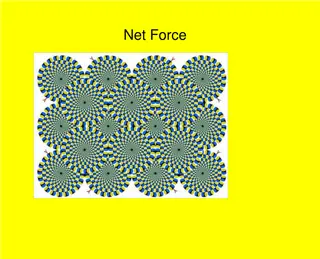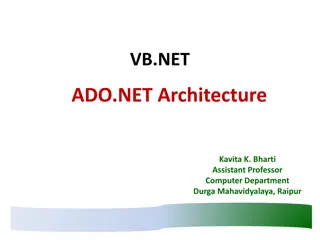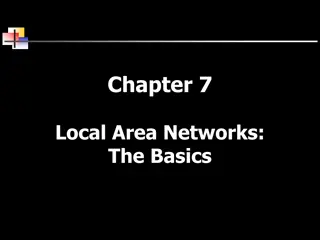Understanding VB.NET: Features, Advantages, and Disadvantages
VB.NET is a popular object-oriented programming language developed by Microsoft as a successor to Visual Basic 6. It offers features like object-oriented programming, automatic code formatting, multithreading, and event management. Despite its advantages in code formatting and ease of web application development, VB.NET has limitations like no direct pointer handling and potential job market challenges due to its widespread use. Understanding the features, advantages, and disadvantages of VB.NET can help developers make informed decisions when choosing a programming language for their projects.
Download Presentation

Please find below an Image/Link to download the presentation.
The content on the website is provided AS IS for your information and personal use only. It may not be sold, licensed, or shared on other websites without obtaining consent from the author. Download presentation by click this link. If you encounter any issues during the download, it is possible that the publisher has removed the file from their server.
E N D
Presentation Transcript
ASP.NET TECHNOLOGY INTRODUCTION TO WEB NET
What is Visual Basics.NET? What is Visual Basics.NET? VB.NET stands for Visual Basic.NET, and it is a computer programming language developed by Microsoft. It was first released in 2002 to replace Visual Basic 6. VB.NET is an object-oriented programming language. This means that it supports the features of object-oriented programming which include encapsulation, polymorphism, abstraction, and inheritance.
VB.NET Features VB.NET is not case sensitive like other languages such as C++ and Java. It is an object-oriented programming language. It treats everything as an object. Automatic code formatting, XML designer, improved object browser etc. Garbage collection is automated. Support for Boolean conditions for decision making.
VB.NET Features Simple multithreading, allowing your apps to deal with multiple tasks simultaneously. Simple generics. A standard library. Events management. References. You should reference an external object that is to be used in a VB.NET application. Attributes, which are tags for providing additional information regarding elements that have been defined within a program. Windows Forms- you can inherit your form from an already existing form.
Advantages of VB.NET Advantages of VB.NET o Your code will be formatted automatically. o You will use object-oriented constructs to create an enterprise-class code. o You can create web applications with modern features like performance counters, event logs, and file system. o You can create your web forms with much ease through the visual forms designer. You will also enjoy drag and drop capability to replace any elements that you may need. o You can connect your applications to other applications created in languages that run on the .NET framework. o You will enjoy features like docking, automatic control anchoring, and in-place menu editor all good for developing web applications.
Disadvantages of VB.NET o VB.NET cannot handle pointers directly. This is a significant disadvantage since pointers are much necessary for programming. Any additional coding will lead to many CPU cycles, requiring more processing time. Your application will become slow. o VB.NET is easy to learn. This has led to a large talent pool. Hence, it may be challenging to secure a job as a VB.NET programmer.























